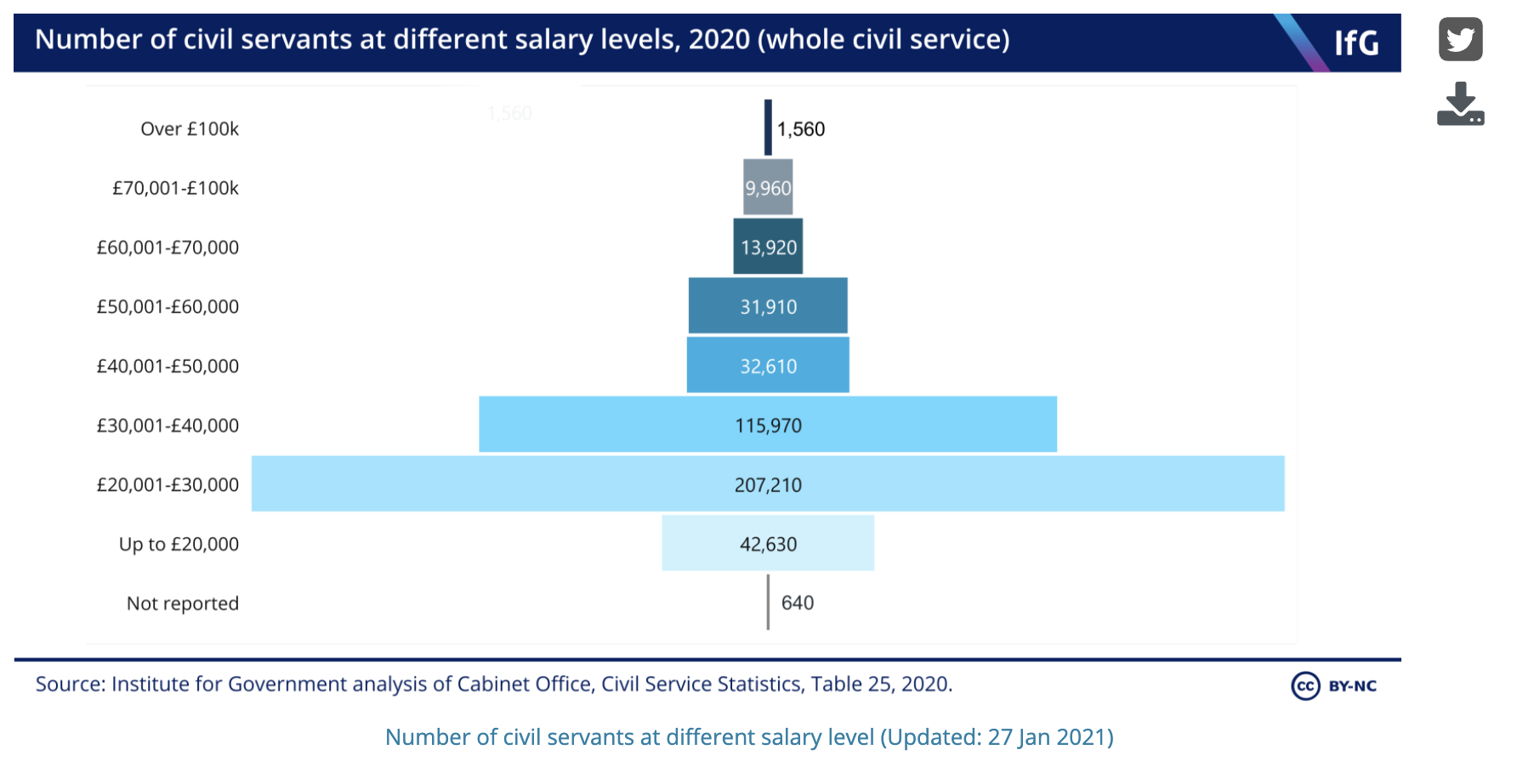Britain's Civil Service Revolution: Will Tying Pay to Performance Work?
The UK civil service has long been criticized for being slow to adapt to changing circumstances and resistant to reform. However, a shift towards performance-based pay is underway, with far-reaching implications for the way government employees are rewarded and motivated. As the public sector faces increasing pressure to improve efficiency and reduce costs, the need for innovative solutions has never been greater. In this article, we'll explore the evolution of pay structures in the UK civil service, the benefits and challenges of tying pay to performance, and what this means for the future of the sector.
The UK civil service has traditionally operated on a meritocratic system, where promotions and pay rises are based on an individual's length of service and qualifications. However, this approach has been criticized for being out of step with modern workplace practices. Many private sector companies have adopted performance-based pay, where employees are rewarded for meeting specific targets and delivering results. This approach has been shown to boost motivation, increase productivity, and improve overall performance.
One of the key drivers behind the shift towards performance-based pay is the need for greater accountability in the public sector. With taxpayers footing the bill for government services, there is a growing expectation that officials should be held to high standards of performance. By tying pay to performance, the government aims to create a more meritocratic system, where employees are rewarded for their hard work and achievements.
Another key benefit of performance-based pay is its ability to attract and retain top talent. In a competitive job market, top civil servants are often poached by private sector companies that offer more flexible and lucrative working arrangements. By offering performance-based pay, the government can attract and retain the best and brightest, while also reducing the risk of losing skilled employees to competitors.
However, there are also challenges associated with tying pay to performance. One of the main concerns is that it could lead to a focus on short-term targets, rather than long-term goals. If employees are only rewarded for meeting specific targets, they may be incentivized to take shortcuts or prioritize their own interests over the needs of the organization. This could undermine the trust and credibility of the civil service, and damage its reputation with the public.
Another challenge is that performance-based pay can be difficult to measure and evaluate. What constitutes "good performance" is often subjective and can vary depending on the context and goals of the organization. If not implemented carefully, performance-based pay could lead to arbitrary and unfair judgments, which could damage employee morale and motivation.
To address these challenges, the government is introducing a range of measures to support the implementation of performance-based pay. These include training and development programs to help civil servants understand the importance of performance metrics and how to measure success. The government is also establishing a range of performance targets and goals, which will be used to evaluate employee performance and determine pay rises.
History of Pay Structures in the UK Civil Service
The UK civil service has a long history of pay structures that have evolved over time. In the past, pay was often tied to length of service, with promotions and pay rises based on an individual's level of experience. However, this approach has been criticized for being out of step with modern workplace practices.
In the 1980s, the government introduced a range of reforms aimed at increasing efficiency and reducing costs. One of the key changes was the introduction of a new pay grading system, which aimed to increase flexibility and fairness in the way pay was awarded. However, this system was also criticized for being too rigid and inflexible, with many employees feeling that they were being unfairly penalized for seeking promotions.
Types of Performance-Based Pay
There are several types of performance-based pay that are being introduced in the UK civil service. These include:
- Target-based pay: This involves setting specific targets and goals for employees, which are used to evaluate performance and determine pay rises. This approach is designed to be flexible and adaptable, allowing employees to prioritize their own goals and objectives.
- Budget-based pay: This involves linking pay to specific budget targets, which are used to evaluate performance and determine pay rises. This approach is designed to be more transparent and accountable, with employees held accountable for their contribution to the overall budget.
- Merit-based pay: This involves paying employees based on their individual performance and achievement, rather than their level of experience or qualifications. This approach is designed to be more flexible and adaptable, allowing employees to prioritize their own goals and objectives.
Benefits of Performance-Based Pay
There are several benefits to performance-based pay in the UK civil service. These include:
- Increased motivation and engagement: By tying pay to performance, employees are more likely to be motivated and engaged in their work, as they are directly rewarded for their achievements.
- Improved productivity and efficiency: By setting specific targets and goals, employees are more likely to be focused on delivering results, which can lead to improved productivity and efficiency.
- Better accountability and transparency: By linking pay to performance, the government can hold employees accountable for their actions and decisions, which can lead to improved transparency and accountability.
Challenges of Performance-Based Pay
There are also several challenges associated with performance-based pay in the UK civil service. These include:
- Measuring and evaluating performance: It can be difficult to measure and evaluate performance, particularly in areas where the outcome is not immediately measurable.
- Focusing on short-term targets: If employees are only rewarded for meeting specific targets, they may be incentivized to prioritize their own interests over the needs of the organization.
- Arbitrary and unfair judgments: If performance metrics are not carefully designed, they can lead to arbitrary and unfair judgments, which can damage employee morale and motivation.
Future of Performance-Based Pay in the UK Civil Service
The future of performance-based pay in the UK civil service is uncertain, but it is likely to be a key driver of change in the sector. As the public sector faces increasing pressure
Matthew Labyorteaux Net Worth
Mingus Reedus
Diddy And Cameroniaz
Article Recommendations
- Rebecca Pritchard Net Worth
- Rick Harrison Net Worth
- Sabrina Carpenter Height Feet
- Nyannie
- Blockchaind
- Lyra Crow Fans
- Neil Flynn
- Carly Janed
- Beyonc
- Elon Musk Wife



